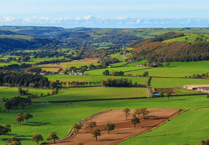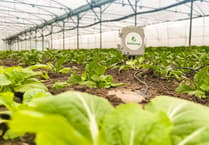A rural insurance expert is urging the public to help ease the burdens faced by farmers across the country during the busy lambing and calving season.
Anderson Fossett, of rural insurance broker Lycetts, has called on walkers, ramblers and families visiting the countryside to be mindful of the additional pressures that livestock farmers face at this time of year.
Fossett has cautioned against the allure of interacting with newborn farm animals, highlighting the potential risks involved.
“The desire to pet or feed cute young animals is natural, yet overlooking the consequences of such actions can be hazardous,” he said.
“Approaching these animals is ill-advised as their protective parents might perceive it as a threat, potentially leading to aggressive responses. A cow may look placid, but there is no way of knowing its temperament.
“It’s prudent to avoid any actions that could lead to distress or pose a risk of injury just for a moment’s photo opportunity.”
He stressed the importance of using public right of way and marked paths only, and of planning walking routes in advance to avoid the temptation to cut across fields if lost.
“Walkers should also be aware that farmers may have deliberately left gates open – or closed – to control livestock movement, so the public should leave them as they find them.
“There have been a number of incidents where dogs have triggered cattle to attack and so it is vital that walkers ensure their pets are on a lead whenever in the presence of livestock.
“It can be a very stressful period for farmers, many of whom work 18-hour days tending pregnant cows and sheep and newborns.
“Through increased awareness and responsible actions, the public can significantly contribute to a safe and productive season for both the agricultural community and countryside enthusiasts alike.”
Safety warnings are also regularly issued for pregnant women, urging them to avoid contact with sheep or other animals which are due to give birth in light of the health risks.
Pregnant women who come into close contact with sheep during lambing or other farm animals that are giving birth may risk their own health, and that of their unborn child, from infections that such animals can carry.
Public Health England, Department of Health, Department for Environment, Food and Rural Affairs, Animal and Plant Health Agency and the Health and Safety Executive, in association with the Welsh Government and Public Health Wales, the Scottish Government and Health Protection Scotland and the Departments of Agriculture and Rural Development (DARD) and of Health, Social Services and Public Safety (DHSSPS) in Northern Ireland have issued annual advice for a number of years that women who are or may be pregnant should avoid animals that are giving, or have recently given, birth.
Although the number of human pregnancies affected by contact with an infected animal is extremely small, it is important that pregnant women are aware of the potential risks and take appropriate precautions. These risks are not only associated with sheep, nor confined only to the spring (when the majority of lambs are born). Cattle and goats that have recently given birth can also carry similar infections.
To avoid the possible risk of infection, pregnant women should:
- not help ewes to lamb, or to provide assistance with a cow that is calving or a nanny goat that is kidding
- avoid contact with aborted or new-born lambs, calves or kids or with the afterbirth, birthing fluids or materials (eg bedding) contaminated by such birth products
- avoid handling (including washing) clothing, boots or any materials that may have come into contact with animals that have recently given birth, their young or afterbirths. Potentially contaminated clothing will be safe to handle after being washed on a hot cycle
- ensure contacts or partners who have attended lambing ewes or other animals giving birth take appropriate health and hygiene precautions, including the wearing of personal protective equipment and clothing and adequate washing to remove any potential contamination.
Pregnant women should seek medical advice if they experience fever or influenza-like symptoms, or if concerned that they could have acquired infection from a farm environment.
Farmers and livestock keepers have a responsibility to minimise the risks to pregnant women, including r family, the public and professional staff visiting farms.
If you are visiting farm land observe the countyside code, keep dogs on a lead and leave gates as you find them



